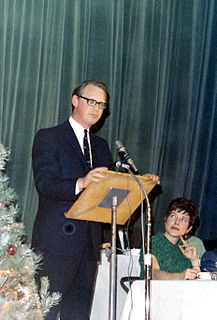This article needs additional citations for verification .(April 2014) (Learn how and when to remove this template message) |
The 1978 Yukon general election, held on November 20, 1978, was the first conventional legislative election in the history of Canada's Yukon Territory. Prior elections were held to elect representatives to the Yukon Territorial Council, a non-partisan body that acted in an advisory role to the Commissioner of the Yukon. Following the passage of the Yukon Elections Act in 1977, the 1978 election was the first time that voters in the Yukon elected representatives to the Yukon Legislative Assembly in an election organized along political party lines.

Canada is a country in the northern part of North America. Its ten provinces and three territories extend from the Atlantic to the Pacific and northward into the Arctic Ocean, covering 9.98 million square kilometres, making it the world's second-largest country by total area. Canada's southern border with the United States is the world's longest bi-national land border. Its capital is Ottawa, and its three largest metropolitan areas are Toronto, Montreal, and Vancouver. As a whole, Canada is sparsely populated, the majority of its land area being dominated by forest and tundra. Consequently, its population is highly urbanized, with over 80 percent of its inhabitants concentrated in large and medium-sized cities, many near the southern border. Canada's climate varies widely across its vast area, ranging from arctic weather in the north, to hot summers in the southern regions, with four distinct seasons.

Yukon is the smallest and westernmost of Canada's three federal territories. It has the smallest population of any province or territory in Canada, with 35,874 people. Whitehorse is the territorial capital and Yukon's only city.
The Yukon Territorial Council was a political body in the Canadian territory of Yukon, prior to the creation of the Yukon Legislative Assembly. Although not a full legislature, the council acted as an advisory body to the Commissioner of Yukon, and had the power to pass non-binding motions of legislation which would be forwarded to the commissioner for consideration.
Contents
Hilda Watson, the first woman ever to lead a political party into an election in Canada, was the leader of the Progressive Conservatives. Although the party won the election, Watson herself was defeated in Kluane by Liberal candidate Alice McGuire, and thus did not become government leader. The position of government leader instead went to Chris Pearson.

Hilda Pauline Watson was a Canadian schoolteacher and politician from the Yukon Territory. She was the first woman in Canadian history to lead a political party which was successful in having its members elected.

The Yukon Party is a conservative political party in Yukon, Canada. It is the successor to the Yukon Progressive Conservative Party.

Kluane is an electoral district which returns a member to the Legislative Assembly of the Canadian territory of Yukon. It is named after Kluane National Park, which is within the riding. It is one of the Yukon's eight rural districts.
New Democratic leader Fred Berger was also defeated in his own riding. He remained leader of the party until 1981, when he was succeeded by the party's sole elected MLA, Tony Penikett. Under Penikett's leadership, an MLA who had been elected as an independent in 1978 joined the NDP, and the party won a by-election. With its caucus increased to three members, the NDP had thus supplanted the Liberals as the official opposition by the time of the 1982 election.

The Yukon New Democratic Party is a social-democratic political party in the Yukon territory of Canada.
Fred Berger (1932–2009) was a Canadian politician. First elected to the non-partisan Yukon Territorial Council in the 1974 territorial election, he became the first leader of the Yukon New Democratic Party when the territory adopted political parties for the first time in the 1978 election. Berger was not elected to the Yukon Legislative Assembly, however, losing to Meg McCall in the Klondike electoral district.

Antony David John "Tony" Penikett is a mediator and negotiator and former politician in Yukon, Canada, who served as Premier of Yukon from 1985 to 1992.









